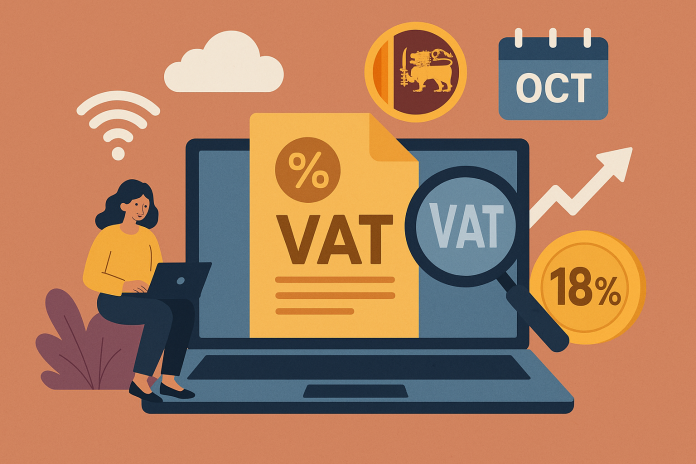The government of Sri Lanka has announced that Value Added Tax (VAT) at a rate of 18% will be imposed on a broad range of digital services provided within the country, starting from 1 October 2025. This decision marks a significant shift in the taxation of the digital economy and aims to bring Sri Lanka’s tax framework in line with global practices.
The measure is introduced under the Value Added Tax (Amendment) Act No. 04 of 2025, and its implementation is outlined in Extraordinary Gazette No. 2443/30, issued by the Inland Revenue Department (IRD) on 1 July 2025.
Who will be affected?
The new VAT provisions primarily target non-resident service providers who deliver digital services to customers in Sri Lanka via electronic or digital platforms. These providers will be required to register for VAT with the IRD if they meet either of the following thresholds:
- Their total taxable digital services supplied to Sri Lankan customers exceed Rs. 60 million during the preceding 12 months, or
- Their total taxable digital services exceed Rs. 15 million in the most recent calendar quarter.
Both business-to-business (B2B) and business-to-consumer (B2C) transactions are covered, and the obligation to collect and remit VAT falls on the non-resident supplier.
Categories of taxable digital services
The following categories of services fall under the scope of the new digital VAT regime:
- E-commerce services
- Cloud computing services
- Software as a Service (SaaS)
- Cybersecurity services
- Digital marketing and advertising
- IT support and managed services
- Streaming services (e.g., video and music platforms)
- Financial technology (FinTech) services
- Subscription and membership-based websites
- E-commerce platforms
- Social media platforms
- On-demand service platforms (e.g., ride-hailing or food delivery)
- Content sharing platforms
- Cloud collaboration platforms
- Marketplace platforms
- Online gaming platforms
- Blockchain and NFT platforms
- Mobile or web applications for hotel bookings and travel ticket reservations
These services will be liable for VAT at 18% starting 1 October 2025.
Registration and compliance
The IRD has issued procedural guidelines for VAT registration, filing, and payment obligations for foreign suppliers. Non-resident entities are expected to register via a simplified online system to ensure compliance. Local representatives may also be appointed for tax purposes.
The new policy aims to broaden the tax base, level the playing field between local and foreign digital service providers, and increase revenue from the fast-growing digital sector.
The Inland Revenue Department is expected to conduct awareness sessions and publish further clarifications in the coming months.





